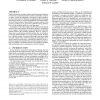Free Online Productivity Tools
i2Speak
i2Symbol
i2OCR
iTex2Img
iWeb2Print
iWeb2Shot
i2Type
iPdf2Split
iPdf2Merge
i2Bopomofo
i2Arabic
i2Style
i2Image
i2PDF
iLatex2Rtf
Sci2ools
137
click to vote
AMEC
2003
Springer
2003
Springer
Improving Learning Performance by Applying Economic Knowledge
Digital information economies require information goods producers to learn how to position themselves within a potentially vast product space. Further, the topography of this space is often nonstationary, due to the interactive dynamics of multiple producers changing their position as they try to learn the distribution of consumer preferences and other features of the problem’s economic structure. This presents a producer or its agent with a difficult learning problem: how to locate profitable niches in a very large space. In this paper, we present a model of an information goods duopoly and show that, under complete information, producers would prefer not to compete, instead acting as local monopolists and targeting separate niches in the consumer population. However, when producers have no information about the problem they are solving, it can be quite difficult for them to converge on this solution. We show how a modest amount of economic knowledge about the problem can make i...
Related Content
| Added | 06 Jul 2010 |
| Updated | 06 Jul 2010 |
| Type | Conference |
| Year | 2003 |
| Where | AMEC |
| Authors | Christopher H. Brooks, Robert S. Gazzale, Jeffrey K. MacKie-Mason, Edmund H. Durfee |
Comments (0)

